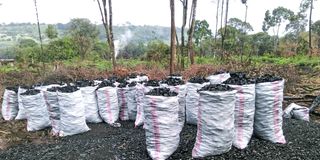Premium
To save our trees, we need policy on sustainable charcoal production

Bags of confiscated charcoal impounded by Kenya Forest Service officers at Nyakweri Forest in Trans Mara. There is need for efficient production and use of charcoal.
What you need to know:
- Tree growing already happens across Kenya but there is need for a supportive government policy and investment.
- Woodlands has pioneered the idea of using seed-balls to plant trees as opposed to seedlings.
- Some 545 farmers have 240 hectares under the trees, which they intercrop with groundnuts and beans.
- Kefri is also collaborating with the Beijing-based International Organisation for Bamboo and Rattan to boost growing of the grasses.
The best way to conserve public and communal forests is to grow more trees and use them sustainably to produce charcoal.
Fast-growing species on private land will help keep pressure off natural forests, according to experts.
Tree growing already happens across Kenya but there is need for a supportive government policy and investment.
Take the case of Kakuzi Ltd. The Murang’a-based agricultural products firm branched into tree farming in the 1990s.
It has 3,000 acres of eucalyptus from which it processes timber and poles for sale. From off-cuts and left over logs, it produces charcoal using modern kilns.
One study funded by DFID dubbed “Sustainable feedstock management for charcoal production in Kenya,” found that the cost of producing a bag of charcoal was Sh159. Kakuzi then sold at Sh260 in the open market.
But the lack of a clear policy on charcoal, the study adds, is a constraint to Kakuzi customers, who are often harassed by government officials when transporting the commodity.
“There is no certification system that differentiates charcoal that is sustainably produced and one that may be coming from public forests,” says Nellie Oduor, the lead author who now works for Kenya Forestry Research Institute’s (Kefri) National Forest Products Research Programme.
Woodlands Trust based in Kajiado is another organisation that invests in trees for charcoal production.
When it was started in 2001 by Maxwell Kinyanjui and Carnivore’s Martin Dunford, its initial objective was to supply Carnivore with charcoal. For Carnivore, famous for its nyama choma, this made perfect business sense.
Idea of using seed-balls
Now run by Teddy Kinyanjui, Woodlands has pioneered the idea of using seed-balls to plant trees as opposed to seedlings.
In the technology, seeds are placed inside a ball of charcoal dust mixed with nutritious binders and planted by throwing at a suitable site.
“It makes planting trees easier and cheaper because it eliminates the cost of plastic pots and soil,” Kinyanjui says.
Woodlands has specialised in 15 species of dryland trees, 12 of them acacias. It encourages farmers to intercrop trees with short-term crops such as vegetables, maize and sunflower.
This is also what is happening in another project in Rarieda, Siaya that specialises in Acacia xanthophloea for charcoal.
Some 545 farmers have 240 hectares under the trees, which they intercrop with groundnuts and beans.
Kefri, which provides technical advice to the farmers, says the initiative does not require high capital investments.
Kefri is also collaborating with the Beijing-based International Organisation for Bamboo and Rattan to boost growing of the grasses.
“It will benefit 28,500 people, mostly women, youths, farmers, tree nursery owners, charcoal and furniture producers,” says Oduor who is leading the project.
Obadiah Rono, Narok’s chief officer for water, environment and natural resources, says the county distributes to farmers up to 10 million seedlings annually.
It makes sense for policy to support the sustainable use of such trees. But there is also need for efficient production and use of charcoal, which we address next week.




